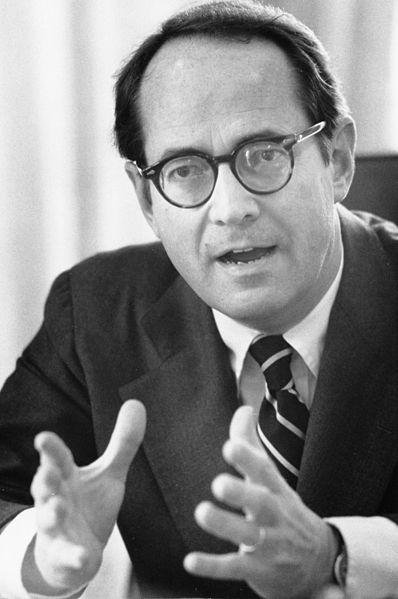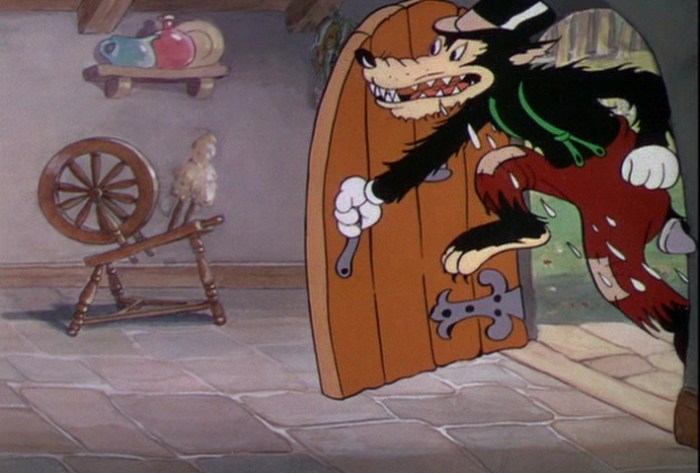Sorry.
I know I probably shouldn’t, but—
—try as I may, I can’t help but hate Dick Thornburgh.

The Big, Bad Wolf (image via http://en.wikipedia.org/wiki/File:Dick_Thornburgh_1978.jpg)
Yes, “hate” is a strong word—maybe even the wrong word. Perhaps, the intensity of my dislike isn’t justified. I’ve admittedly been known to over-react. (Just ask Sara.)
But the family story is this—my parents were in downtown Pittsburgh, my mother in Daddy’s Cadillac, my father just outside it on the sidewalk, when Thornburgh, then the US Attorney for western Pennsylvania, approached my dad on the street, warning, “I’m gonna get you, Tyce McCullough.”
No one in the family seems to remember more than that—
—just Thornburgh, huffing and puffing the threat of federal prosecution—the big, bad wolf on a Pittsburgh street threatening to blow our house in—and in some cases, doing so quite literally—sending FBI agents to break down our steel-reinforced, never-secure-enough front door.
Now, more than forty years later, I’m reading Dick Thornburgh’s autobiography, Where the Evidence Leads.
Now Daddy’s dead, the big, bad wolf’s an old man, and I’m all grown up, learning a bit about the historical context surrounding my very personal Dick-Thornburgh-meets-the-Mafia, family tragedy.
Before he went on to become Pennsylvania governor and the US Attorney General under both presidents Reagan and Bush Senior, Thornburgh, Nixon’s US Attorney for western PA, took it upon himself to fight organized crime in the state.
Early in his tenure, the Pennsylvania Crime Commission, on which Thornburgh served, released a report indicating that Mafia bosses were paying 4 to 6 million dollars annually to local law enforcement officials to turn their backs on organized crime.
According to Ray Sprigle, Pulitzer Prize winning reporter for the Pittsburgh Post-Gazette:
Racket bosses elect and finance alderman and constables. The ward chairmen then maintain and protect the operation of the racket bosses in their wards through control of the police department and police inspectors. (Thornburgh 41)
The big, bad wolf didn’t like this. He was outraged. He huffed.
Though these payoffs were obviously illegal, it was the 1970 Organized Crime Control Act that allowed Thornburgh to do what he did. Before this legislation, federal officials were only allowed to intervene in interstate organized crime activity. Before 1970, this, along with bribes paid to local law enforcement, allowed folks like my father to do what they did and get away with it—make mountains of money and avoid federal income tax.
Illegal gambling was what the big, bad, wolf called the Mafia’s “cash register.”
What was specifically tragic for my family was this. The biggest numbers operation in the state, the one Thornburgh set his sights on, was the one run by my Daddy’s boss. In fact, when on November 21, 1970, 100 federal agents raided 22 locations across the state suspected of housing illegal gambling operations, my father was the only one locked in a steel room with the supposed king pin of it all—a man I’ll call Uncle B.
Talk about wrong-time-wrong-place.
According to Pittsburgh newspapers that covered the trial, FBI agents who broke down the front door at that Ross Township house (decked out with what to me at the time seemed an amazing indoor swimming pool), encountered Uncle B’s wife screaming and blocking access to the basement room in which Daddy and Uncle B had locked themselves.
Agents reported hearing grinding behind the door of that steel reinforced room. According to my mom, the room was equipped with a 1970s shredder, but when my Dad and Uncle B were unable to shred incriminating documents fast enough, they began putting papers down a garbage disposal, and when that failed, began burning the stuff. Though agents were never able to break into that space, Daddy and Uncle B nearly exfixiated themselves trying to start a fire in the small, windowless room.
My mom says this is what ultimately forced they themselves to open the door—
—to the big bad wolf on the other side—huffing and puffing and fueling the flames.
Daddy, Uncle B, and more than twenty others were arrested that day.
But the big, bad wolf was only getting started, and those papers—burnt, shredded, or otherwise—wouldn’t mean much in the end.
—to be continued—




















![cash-register_1_sm[1]](https://kathrynmmccullough.com/wp-content/uploads/2011/09/cash-register_1_sm1.gif?w=700)

This is truly fascinating Kathy. The role reversal, in a way, with the supposed good guy becoming the big bad wolf makes an interesting perspective, because really what are mafia families but families trying to make their way in the world? Who defines what is right and what is wrong? And, given the political climate today, what makes our government any better than mafia kingpins when it comes to getting away with murder? This memoir is going to be brilliant and fascinating, Kathy. Keep it coming.
LikeLike
Isn’t that the truth! The role reversal is incredible to me too. And the historical/political context is amazing. It’s ultimately ironic that Thornburgh was the hand of the Nixon administration prosecuting these people I love for doing the same kinds of thing they themselves were guilty of–just in another context. The irony is almost too much! I love your feedback, Lisa. Thank you, my friend. (Thank God you got your internet up and running–very selfish of me, I know.)
LikeLike
I think lots of people jump on the “get tough on crime” bandwagon and then are willing to do anything to feed that personna. It’s all one big racket. And it won’t change.
LikeLike
I think you are so right. Do you suppose it makes them feel tough or what? I mean, I hate crime as much as the next guy, but sometimes fighting it just gets taken too far. Thanks so much for reading and taking the time to comment. I hope you’ll come back soon!
LikeLike
This is such an interesting experience to have witnessed as a child. I’m hard pressed to understand it as an adult, so I can’t imagine what sense could be made of everything at a young age!
LikeLike
I think as a child I didn’t even realize there needed to be sense made of it. It was my only experience. It was my normal, which is the problem. Kids just assume there experience is normal until they learn otherwise, and then the confusion sets in big time!
LikeLike
This was fantastic, Kathy. I can’t imagine what it’s like for you to read that book either!
LikeLike
It’s been bizarre, actually. But, I have learned so much that has allowed me to make sense of the past. Now it all makes so much more sense. I have always been one of those people who needs to understand context. Thanks, Rose. Glad you liked this one!
LikeLike
I’m with Lisa…this is going to be a great memoir! 🙂
LikeLike
Thanks, Mark. I’d love for you to read it some day. Glad you’d like to. Hope you have a great weekend, my friend!
LikeLike
Kathy- I grew up outside Pittsburgh in the 80s and remember, from a child’s perspective, of course, how ominous Thornburgh was when we would see him on the evening news. He left a strong, and not positive, impression on my young mind for whatever reason. When I was an adult living in another state, there was a man, secretary of education for that state, with a vaguely similar last name and a vaguely similar look on his face as Thornburgh, and I had the hardest time being objective about his job in education because I always associated him with Thornburgh. I never had personal experience with him the way you did, but I think it’s very telling that a child watching the news, and not being old enough to really understand much of it, could have formed such a negative impression of him. I can’t imagine how I would feel, had I come face-to-face with him as he targeted my father. Of course you “hate” or “intensely dislike” him. What a horrible experience to have at any age, but so much worse at your young age!
LikeLike
Gosh, Dana, this is fascinating to hear–so, so fascinating. I had forgotten you said you grew up in Pittsburgh. I’m kind of relieved to know I’m not the only one who felt that way. I always knew there was no way I could be objective, so I could never trust my perception. Your saying this may be one of the most interesting things I’ve heard in a long time! Thanks so much for sharing it! Can’t wait to pass this information on to the rest of my family!
LikeLike
Excellent! This is indeed a fascinating memoir…I glued to the page as I read.
LikeLike
Oh, cool, Charlie! Glued to the page is awesome! I’m grinning ear to ear!
LikeLike
A cliffhanger! Noooooo! Excellent writing, Kathy. xo
LikeLike
Thank you, dear Jean! Sorry to leave you hanging. Mean of me, isn’t it? Hugs to you, my friend!
LikeLike
Very interesting. It was interesting to read this post after reading the newspaper article about the raid, which included testimony from the Boss’s wife, I believe. Blending the news reporting, with your family’s perspective makes for good reading.
LikeLike
Actually, I’m really glad to hear you think a blendiing of the two work. It’s fascinating to me, but I didn’t know how others would respond. Thanks for sharing this. I’m really glad to know this. This is such a helpful comment! Hope you will come back and read more.
LikeLike
Great going, Kathy. Very interesting journey! Look forward to what’s next.
LikeLike
Thanks for reading, Maryanne. Glad you’re enjoying these posts. Hope you have a great weekend!
LikeLike
Once again, I am reading your story with such interest. I have never known anyone personally to have lived this life. The fact that you are willing to share it with us is gratefully appreciated.
LikeLike
You are so welcome. It’s a story I feel compelled to share, so it’s especially meaningful when folks like you so want to read it. I, actually, must thank YOU for doing just that. Your feedback and enthusiasm motivate me to keep going! Thank you! Thank you!
LikeLike
I can’t wait to hear the rest. It is always interesting to hear the other side.
LikeLike
Thanks Deb! Like I said to mzem, when folks expressed a desire to read more, it motivates me to keep writing. I’m thrilled you are interested, but then you live in Italy.
LikeLike
I agree with Liza–the blending of the newspaper articles with the childhood memory really works well! It leaves me wondering which version is the “true” version. There are obvious places where the facts line up (the events of the night your father was arrested, for instance), but then there are obvious places where bias and perspective depart from one another. I think it’s fascinating because it calls attention to the fact that there are always three points of view to any story: yours, mine, and the truth. And we rarely know the truth. I do think, though, that with a blend of the “yours” and “mine” POVs, we get a little bit closer to the truth (whatever that means).
It’s so fascinating! I can’t wait to read more. Sorry I’ve been a slacker on the comments. I’m trying to bang out this last chapter so that I can officially say I’m done, and for some reason it’s not coming as easily as the others that came before. Sigh. But I do read when I can and I love what I’m reading! 🙂
LikeLike
Great thoughts, Amanda. I personally don’t think there is a “true” version. I see multiple truths, as seen from varying perspectives–and that may be the most important Truth of them all, if there is, indeed, such a thing–that life is complicated, and right and wrong, are to one degree or another, matters of where you’re seeing from.
There’s so much to think about as I write this memoir, and my readers help me see so many of them. I’m thankful to be able to see things, as well, from many of your perspectives–which is why comments are so valuable. Thanks for your insights, my friend!
LikeLike
I’m not familiar with Dick Thornburgh, but this continues to be a fascinating story and I am definitely hooked!
LikeLike
Cool, Mark! Glad to know I’ve managed to hook you! You have made my day, Mark!
LikeLike
This just confirms to me how fragile the balance is between right and wrong – and which side should be called right and which side should be called wrong
– As a young child I lived where wrong was taught as right (apartheid era) and I never even questioned it. It was just how things were. Years later I still puzzle as to why I didn’t question things – it’s so strange sometimes, living in our upside down world.
I’m loving your story Kathy – I will buy your book for sure 🙂
LikeLike
Boy, isn’t that the truth–it is a fragile balance. That may be one of the greatest lessons I’ve had to learn in my life. But, yes, I can only imagine what it must have felt like to grow up white in that environment. Wouldn’t that make for a great memoir? Memoir or not, I would love to see you write about it. Thanks for this insight, Jackie. This is a biggie!
LikeLike
Oh my goodness Kathy – I feel like I have been away for years meanwhile your blog has been galloping along with even more fascinating material!!! This is all very exciting and reads like a film script albeit a bit scary that you actually lived through some of these experiences but oh my you know how to tell a story. I’ve never heard of Dick Thornburgh but it didn’t matter and as I was actually giggling at the picture of them trying to get rid of those papers even though it’s not really funny – you need to get that book out. Now.
LikeLike
Oh, Penny, I love you for this comment! I can’t believe you think I tell a story well, as I think that’s one aspect of writing I might be less good at. So maybe there’s hope for me in that regard.
I too had to laugh at the garbage disposal and all–and you’d laugh even more if you’d known my dad. He had a great sense of humor! I can imagine his laughing at it, and I want to laugh even more.
Thanks so much for reading! It’s great to hear from you!
LikeLike
It is so interesting to hear/read this from your perspective. When things like this come up in the news, not much (if anything at all) is said about the families (especially the children) involved.
LikeLike
Exactly, Robin. I wonder how many mafia memoirs have been written by the children who live that life–if any. I’ve never heard of one. Has anyone else out there? Thanks for reading. Hope you had a great weekend!
LikeLike
LOVE it!
LikeLike
Thanks–I had fun with this post. Somehow the image just worked.
LikeLike
Another great post, Kathy. You’re doing a GREAT job of blending your research materials in with your own story and experiences. The simple fact that you *have* sources like these that relate directly to your upbringing will make this memoir a bestseller for sure! (I.e. Not only do you have an exciting story to tell, but you also have the texts of other people who have told your story through other news outlets. So neat!)
LikeLike
I’ve thought that all along, but you are the first reader to actually mention it. Thank God I have these sources. Thanks for noticing, Dana.
LikeLike
Good luck with your continued research! (The only downside to having the other sources is that you actually have to *read* through them all!)
Having this story to tell is god’s gift to you… and telling the story through your memoirs and blog posts is your gift to us. 🙂
LikeLike
Thanks so much, Dana. I hope I will make it to the library, but at the moment it’s not looking good. No opportunity yet.
You’re a sweetie!
LikeLike
Is this going to be a book? The episodes are amazing, but I’d love to see read it all in a logical sequence. It’s fascinating. Utterly fascinating.
LikeLike
Yes, yes–it is going to be a book. Now that we are home again after a year in Vietnam and another year in Haiti, I’ve decided to finally tackle my memoir– and am blogging about that process. I too think it’s fascinating and have believed my entire life I would write this book. I believe now is the time. I’m so pleased it interests you too! Thanks for reading!
LikeLike
Perfectly awful human being yes. but men like this are needed to get gangsters, Wall Street sharks and terrorists off the street and locked up.
Love’em or Hate’em – ya gotta have a tough cop on the beat, folks.
LikeLike
I suppose so–these folks are needed–but the child in me, whose hero is her daddy, will likely never agree. But I, certainly, understand this reality. Great to hear from you. Hope you’ll stop by again sometimes soon.
LikeLike
Agreed – we do give these men too much power which they naturally abuse to destroy their political enemies: budd dwyer. Sooner or later we all pay a dreadful price for the atrocities these men perpetrate on one another.
But as much as I sympathize with the “losers” in these power struggles – they bring it on themselves by getting into “confrontations” with each other which any political veteran will tell you is huge “no no.”
LikeLike
Agreed. And my father cerainly brought it on himself. He knew that.
LikeLike